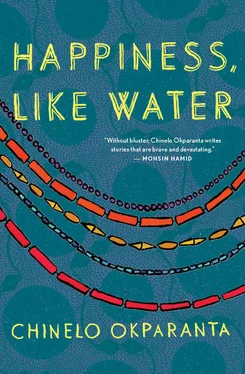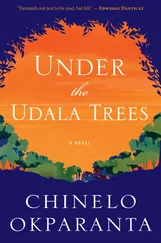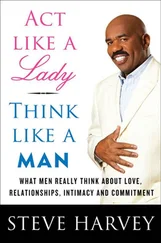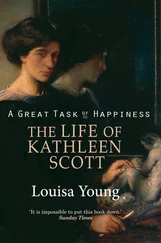She lifts her hands from the bowl where the leaves soak. She shakes the water off her hands and dries them on the skirt of her dress. It is autumn, and the window in front of the sink is cracked open. I feel a draught of the cold breeze on my face, and it surprises me that Ifeinwa is even wearing that dress.
‘You’re not cold?’ I ask, eyeing the little red dress. It was I who chose it, who bought it for her, eager for her to fit in. The first time she wore it, she complained of the cold. She changed back into her wrapper and blouse, both of them with the traditional ankara design. I was petulant about the change, but she insisted. They were better, she said, because she could layer the wrapper all around her body, and its warmth would be only a little short of a blanket’s.
I continue to eye the dress. ‘You’re really not cold?’ I say. I watch as she shakes her head in response. It is not too fervent a shake, but her braids are long, and the movement of her head causes them to whip mildly around her face. I think of Celeste, who does not wear braids, and whose hair is nothing like Ifeinwa’s hair.
Ifeinwa speaks, but with my mind on Celeste, the words that reach me are indecipherable, so I have to ask, ‘What?’
‘Maybe I am, just a little,’ she says. She laughs softly. ‘You know. A little cold. Maybe I’m just a little cold.’
I nod. ‘Yes, of course,’ I say, and then I watch her as she moves away from the sink.
She places the yams on the countertop and then picks up the knife. I think of Celeste holding that knife, of Celeste helping me to plant the surprise. I urge myself to stop looking at Ifeinwa, but it is a struggle to stop, and so I watch from the corner of my eye.
Ifeinwa picks up the first tuber of yam. She peels off the bark until all that remains is the flesh, which glows a milky white. She cuts the yam into cubes, the way we do before boiling. Then she reaches up, opens the cupboard, which is not too far above her head. She grabs a pot from there, transfers the cubes into the pot. She moves on to the remaining tuber of yam.
By then I have progressed from the leaves to the carrots and now to the tomatoes. I slice the tomatoes into thin circles, and I watch as Ifeinwa begins to peel the second tuber of yam.
There is a line that runs along the circumference of that yam. Perhaps she doesn’t think much of it. I imagine now that if she were to have given it only a bit of thought, she might have commented on how eccentric the yam was, as if it had been cut in half and then stuck back together with a kind of invisible glue. Instead, she proceeds to cut it along that preexisting line. Suddenly it’s as if her knife hits a block. She makes a soft, muffled sound, a bit like a whine. I stop with the tomatoes, and I ask her if something is wrong. But I do not offer to help as I usually do, when, for example, she has trouble opening a jar.
She does it all on her own, carving slowly around the core of the block. There is a look of determination on her face. She digs, fusses, groans. When she arrives at the box, she stays a moment just staring at it. Then she extracts it slowly, cautiously, knowingly. It is a light shade of green, the box, delicate like jade.
She exhales. The sound of her exhale is a little like vindication.
She smiles brightly. The ring inside is just a band. Celeste saw that it was so. Still, Ifeinwa tells me, her eyes glazed with tears, how perfect it is.
I go closer to her. I get down on one knee and I take her starchy hands in mine.
‘M huru gin a anya,’ she says, looking down at me. Her voice is suddenly heavy with the cadence of Igbo, but it is soft still. I see you in the eyes, she says.
I look up at her — at her teary eyes, her smile, at the braids that dangle limply around her face. ‘I love you, too,’ I say. And it is true.
That evening, we eat the salad, and then we eat the yam, dipping cubes of it into palm oil — the good old-fashioned way, which is the only way that Ifeinwa will have her yam. This — the yam with palm oil — has become her favourite meal. (She used to buy fufu at the African store down the street. Then she’d spend hours preparing okra soup to eat with the fufu — this used to be her favourite meal. But the odours of the soup and the fufu would rise in the air and would linger, sometimes for days at a time. Eventually I had no choice but to protest. Too rancid, I explained. Not at all American scents.
When she could no longer bear my complaints, she gave in and did away with the fufu and okra soup. She settled for the yam with palm oil.)
After we have eaten, and after Ifeinwa has washed the dishes and I have wiped them dry, she punches the numbers into the phone, all fourteen of them. The phone hangs on the kitchen wall near the fridge and Ifeinwa plays with the dangling cord while she waits for her mother to pick up: she tangles and untangles the cord around her fingers. She does this every time.
‘Mama!’ I hear her say from where I am sitting in the living room. First her back is to the wall, and she is standing. I am not there with her, but I know that this is so, because this is the way that all her calls go.
Next, there is the sound of her sliding, and I know that she has slipped down to the floor, that she is squatting there, talking to her mama on the phone that way. It is the only way she has done it since she arrived.
‘Kedu?’ she says. I imagine her mother answering, ‘Odi mma.’ All is well. I don’t listen to what follows next. But I imagine that when she tells her mama the news, her mama screams and asks, ‘Ezi okwu?’ Is it true? And there is more screaming, happy screaming, and the wrinkles on her mama’s face deepen. At least, I imagine they do.
Next comes the talk of when the wedding will be, because, after all, it has now been made official, even more official than my buying the ticket that brought Ifeinwa here. More official than our living together in America for this entire year. I imagine that her mama exclaims again, from the shock of the announcement, as if the proposal is a surprise. She exclaims, as if she didn’t see it coming, as if she hasn’t always expected it, even from the time I wore maroon knickers and Ifeinwa wore maroon pinafores, from that time when we were mere children in our primary school in Port Harcourt.
We were small children then, and all of us played together, the boys and girls. But we were closer than the rest, Ifeinwa and I, and once, her mama caught me buckling her shoes. It was the harmattan, and there was a breeze, and someone said (her mama or mine), ‘Those two will grow up to marry each other some day.’ The statement came off sing-songy, light and happy, like a blessing. And after that, it was just assumed that that was the way things would be.
In the living room, I lean my back into the couch. I stretch out my legs in front of me, on the coffee table just ahead. I open the newspaper and wait for Ifeinwa to finish on the phone. My gaze shifts from the newspaper to the window. The curtains are drawn just a little open, like a slit. I look through the slit. Outside, the sky is dark.
Ifeinwa enters the room, beaming. Her smile reminds me of Celeste’s, but nothing else about her is like Celeste. She is gentle where Celeste is harsh, submissive where Celeste commands. She was that way even in primary school: pliant and yielding; and so I kept her close.
She waves her fingers in front of me. I fold away the newspaper and smile back, following her with my eyes.
She curls up next to me on the couch. She folds her legs beneath her body and leans her head on my shoulder.
She says, ‘So, this is what you and Celeste were doing, all this time? Finding a way to plant my ring into that tuber of yam?’
I smile and nod. ‘This is what we’ve been doing. It pleases you?’
Читать дальше












